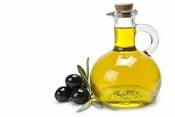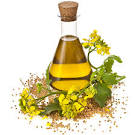Olive Oil vs. Canola Oil – Which Is Better?
 vs.
vs. 
Your body needs healthy fats in order to function properly — and to lose weight. Healthy fats come in the form of foods like avocados and nuts as well as the oils you cook with. Olive oil and canola oil tend to go head to head in their competition to be touted the healthiest cooking oil, but which one is really the victor, hype and advertising campaigns aside? Well, let's find out, shall we?
Canola Oil
Originally known as rapeseed oil, canola oil was primarily used for industrial purposes in the beginning. Although it was cheap to produce, it was inedible because of its dangerous components. Rapeseed oil contained Erucic acid, a fatty acid, which caused heart damage in rats. It also contained bitter compounds called glucosinolates, which made the oil taste like something you might scrape up off the sidewalk. But producers knew that if the oil could be made palatable and fit for human consumption, they were sitting on a gold mine due to the low production cost. So they consulted with Canadian scientists who believed that by using selective breeding, techniques they could create a safe, healthy, and tasty cooking oil.
There is no canola plant. "Canola" is simply a marketing term meaning "Canadian oil." Since 1995, corporate agricultural giant Monsanto has manufactured genetically modified rapeseeds to be resistant to the RoundUp herbicide. It's estimated that 90% of the rapeseed crop worldwide is genetically modified, due to the public concern over GMOs, Monsanto has seen a significant drop in sales of these seeds.
In addition to the GMO status of canola oil, it's produced in a way that should make your hair curl. Unlike the simple processes used to make butter, olive oil, or coconut oil, canola oil requires exposure to extremely high heat, which causes its polyunsaturated to quickly oxidize and become rancid. In the process of extracting the oil from the seeds, a highly toxic solvent, hexane, is used, and traces of it have been found in the end product. This chemical-laden manufacturing process damages some of the oil, which must then be deodorized to remove the unpleasant odor resulting from the damage. None of this information is required to be on the product label, but now you know!
Olive Oil
Olive oil, on the other hand, is extracted from the fruit of the olive tree and has been an important part of the Mediterranean diet since Biblical times. Extra virgin olive oil is one of the few fats accepted as healthy by almost all consumer groups. Some of the healthiest societies in the world have used olive oil as a dietary staple for centuries, and scientific research studies have shown olive oil to contain healthy fatty acids and antioxidants, which provide powerful health benefits that include a reduced risk of heart disease.
Unlike canola oil, producing olive oil is a simple, chemical-free process. The olives are placed in a cold press, which extracts the oil through pressure, no heat needed. The result is a rich-tasting, aromatic oil that's good for your heart and your soul. Extra-virgin, cold-pressed olive oil is the healthiest olive oil option, packed as it is with phenolic antioxidants. Other olive oils — particularly those labeled "light" — may be diluted with soybean or canola oil.
